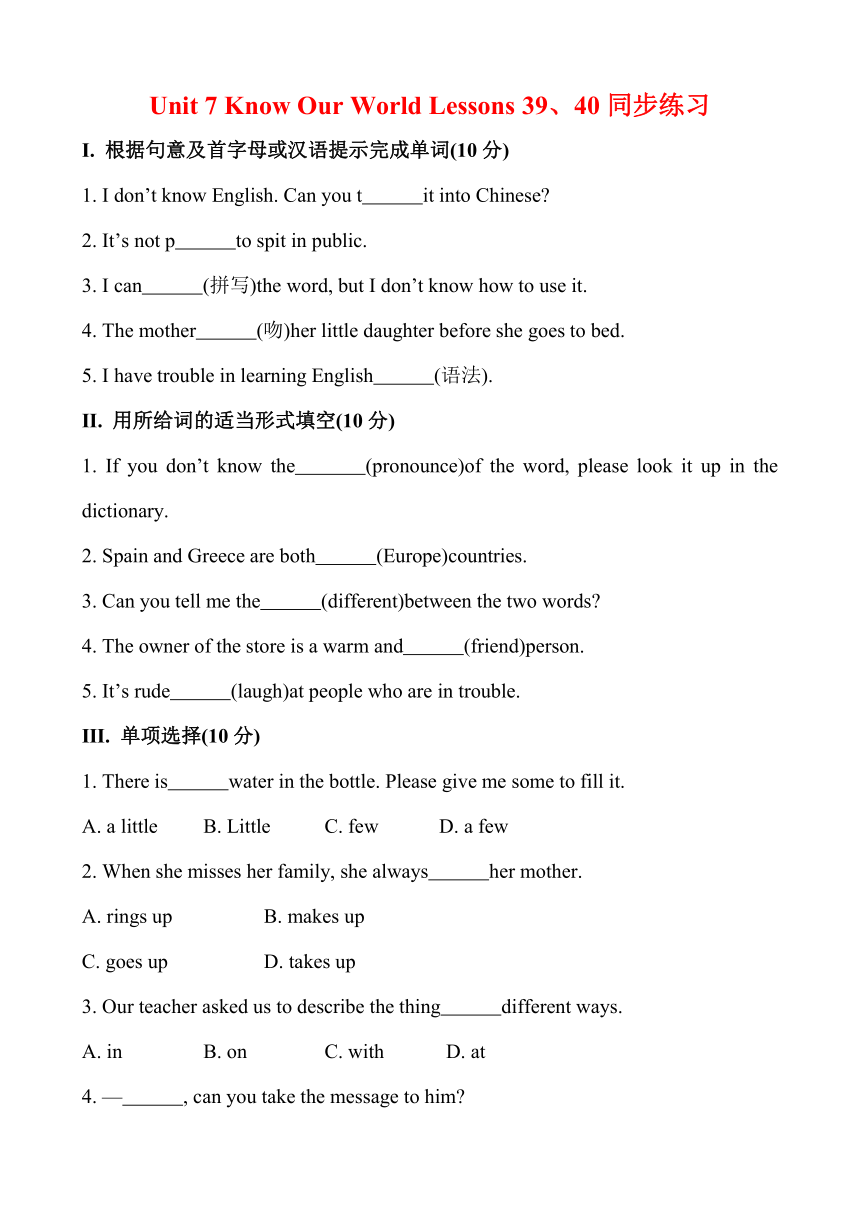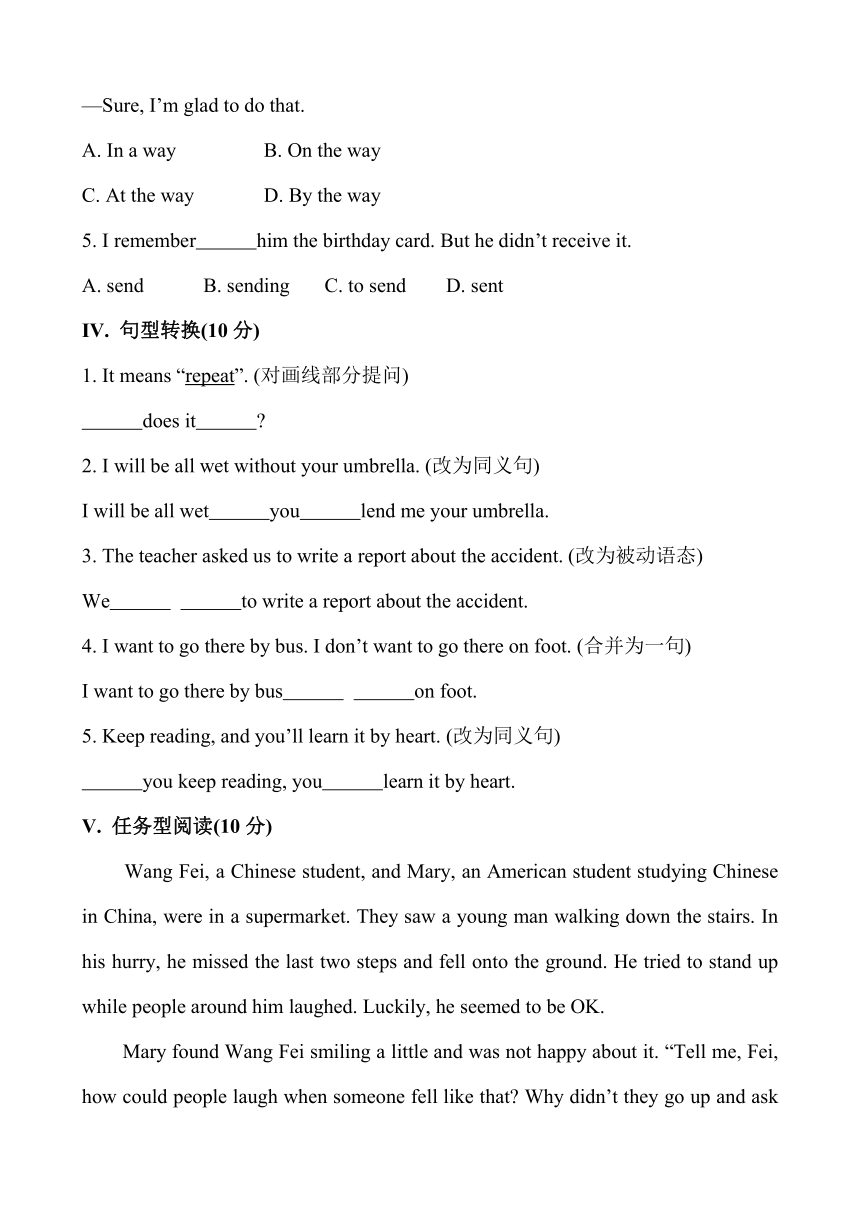翼教版英语八年级下Unit 7 Know Our World Lessons 39、40同步练习及答案
文档属性
| 名称 | 翼教版英语八年级下Unit 7 Know Our World Lessons 39、40同步练习及答案 |

|
|
| 格式 | zip | ||
| 文件大小 | 13.0KB | ||
| 资源类型 | 教案 | ||
| 版本资源 | 冀教版 | ||
| 科目 | 英语 | ||
| 更新时间 | 2016-06-19 15:18:26 | ||
图片预览


文档简介
Unit
7
Know
Our
World
Lessons
39、40同步练习
Ⅰ.
根据句意及首字母或汉语提示完成单词(10分)
1.
I
don’t
know
English.
Can
you
t it
into
Chinese
2.
It’s
not
p to
spit
in
public.
3.
I
can (拼写)the
word,
but
I
don’t
know
how
to
use
it.
4.
The
mother (吻)her
little
daughter
before
she
goes
to
bed.
5.
I
have
trouble
in
learning
English (语法).
Ⅱ.
用所给词的适当形式填空(10分)
1.
If
you
don’t
know
the (pronounce)of
the
word,
please
look
it
up
in
the
dictionary.
2.
Spain
and
Greece
are
both (Europe)countries.
3.
Can
you
tell
me
the (different)between
the
two
words
4.
The
owner
of
the
store
is
a
warm
and (friend)person.
5.
It’s
rude (laugh)at
people
who
are
in
trouble.
Ⅲ.
单项选择(10分)
1.
There
is water
in
the
bottle.
Please
give
me
some
to
fill
it.
A.
a
little
B.
Little
C.
few D.
a
few
2.
When
she
misses
her
family,
she
always her
mother.
A.
rings
up
B.
makes
up
C.
goes
up
D.
takes
up
3.
Our
teacher
asked
us
to
describe
the
thing different
ways.
A.
in
B.
on
C.
with
D.
at
4.
— ,
can
you
take
the
message
to
him
—Sure,
I’m
glad
to
do
that.
A.
In
a
way
B.
On
the
way
C.
At
the
way
D.
By
the
way
5.
I
remember him
the
birthday
card.
But
he
didn’t
receive
it.
A.
send
B.
sending
C.
to
send
D.
sent
Ⅳ.
句型转换(10分)
1.
It
means
“repeat”.
(对画线部分提问)
does
it
2.
I
will
be
all
wet
without
your
umbrella.
(改为同义句)
I
will
be
all
wet you lend
me
your
umbrella.
3.
The
teacher
asked
us
to
write
a
report
about
the
accident.
(改为被动语态)
We
to
write
a
report
about
the
accident.
4.
I
want
to
go
there
by
bus.
I
don’t
want
to
go
there
on
foot.
(合并为一句)
I
want
to
go
there
by
bus
on
foot.
5.
Keep
reading,
and
you’ll
learn
it
by
heart.
(改为同义句)
you
keep
reading,
you learn
it
by
heart.
Ⅴ.
任务型阅读(10分)
Wang
Fei,
a
Chinese
student,
and
Mary,
an
American
student
studying
Chinese
in
China,
were
in
a
supermarket.
They
saw
a
young
man
walking
down
the
stairs.
In
his
hurry,
he
missed
the
last
two
steps
and
fell
onto
the
ground.
He
tried
to
stand
up
while
people
around
him
laughed.
Luckily,
he
seemed
to
be
OK.
Mary
found
Wang
Fei
smiling
a
little
and
was
not
happy
about
it.
“Tell
me,
Fei,
how
could
people
laugh
when
someone
fell
like
that
Why
didn’t
they
go
up
and
ask
him
if
he
was
hurt
”
Wang
Fei
said,
“Because
they
knew
he
wasn’t
hurt
too
much.
”
“But
I
still
don’t
understand.
A
fall
is
a
fall.
In
my
culture,
people
would
never
laugh!
”
This
is
an
example.
The
Chinese
and
the
westerner
will
think
and
act
differently
when
seeing
such
a
thing.
Chinese
people
are
used
to
laughing
or
smiling.
Very
often
the
person
who
is
in
embarrassing(困窘的)situation
would
also
laugh
or
smile
to
get
out
of
it.
However,
if
someone
gets
hurt
seriously,
it
will
not
be
a
laughing
matter
any
more.
People
will
help
him
or
her
instead.
But,
in
that
case,
a
westerner
will
rush
over
and
help
the
person
get
up.
If
a
westerner
falls,
he
or
she,
like
a
Chinese
person,
may
try
to
make
a
joke
if
he
or
she
is
not
hurt.
If
two
close
friends
are
walking
together,
and
one
falls
but
clearly
isn’t
hurt,
a
common
joke
is
to
say
“Have
a
nice
trip”.
So
different
people
have
different
habits
and
different
countries
have
different
cultures.
根据短文内容回答问题。
1.
Will
Wang
Fei
and
Mary
think
and
act
in
the
same
way
if
they
see
a
young
man
falling
down
________________________________________________________
2.
Why
didn’t
people
go
up
and
ask
the
young
man
if
he
was
hurt
________________________________________________________
3.
What
do
Chinese
people
often
do
when
they
find
themselves
in
embarrassing
situation
________________________________________________________
4.
What
is
a
westerner
likely
to
do
when
he
or
she
sees
someone
falling
down
________________________________________________________
5.
What
might
Mary
say
to
Wang
Fei
if
she
fell
but
clearly
was
not
hurt
________________________________________________________
答案解析
Ⅰ.
答案:
1.
translate 2.
polite 3.
spell 4.
kisses
5.
grammar
Ⅱ.
答案:
1.
pronunciation 2.
European 3.
difference(s)
4.
friendly 5.
to
laugh
Ⅲ.
答案:
1~5.
BAADB
Ⅳ.
答案:
1.
What;
mean 2.
if;
don’t 3.
were
asked
4.
instead
of 5.
If;
will
Ⅴ.
答案:
1.
No,
they
won’t.
2.
Because
they
knew
he
wasn’t
hurt
too
much.
3.
They
often
laugh
or
smile.
4.
He
or
she
is
likely
to
rush
over
and
help
the
person
get
up.
5.
She
might
say
“Have
a
nice
trip”.
7
Know
Our
World
Lessons
39、40同步练习
Ⅰ.
根据句意及首字母或汉语提示完成单词(10分)
1.
I
don’t
know
English.
Can
you
t it
into
Chinese
2.
It’s
not
p to
spit
in
public.
3.
I
can (拼写)the
word,
but
I
don’t
know
how
to
use
it.
4.
The
mother (吻)her
little
daughter
before
she
goes
to
bed.
5.
I
have
trouble
in
learning
English (语法).
Ⅱ.
用所给词的适当形式填空(10分)
1.
If
you
don’t
know
the (pronounce)of
the
word,
please
look
it
up
in
the
dictionary.
2.
Spain
and
Greece
are
both (Europe)countries.
3.
Can
you
tell
me
the (different)between
the
two
words
4.
The
owner
of
the
store
is
a
warm
and (friend)person.
5.
It’s
rude (laugh)at
people
who
are
in
trouble.
Ⅲ.
单项选择(10分)
1.
There
is water
in
the
bottle.
Please
give
me
some
to
fill
it.
A.
a
little
B.
Little
C.
few D.
a
few
2.
When
she
misses
her
family,
she
always her
mother.
A.
rings
up
B.
makes
up
C.
goes
up
D.
takes
up
3.
Our
teacher
asked
us
to
describe
the
thing different
ways.
A.
in
B.
on
C.
with
D.
at
4.
— ,
can
you
take
the
message
to
him
—Sure,
I’m
glad
to
do
that.
A.
In
a
way
B.
On
the
way
C.
At
the
way
D.
By
the
way
5.
I
remember him
the
birthday
card.
But
he
didn’t
receive
it.
A.
send
B.
sending
C.
to
send
D.
sent
Ⅳ.
句型转换(10分)
1.
It
means
“repeat”.
(对画线部分提问)
does
it
2.
I
will
be
all
wet
without
your
umbrella.
(改为同义句)
I
will
be
all
wet you lend
me
your
umbrella.
3.
The
teacher
asked
us
to
write
a
report
about
the
accident.
(改为被动语态)
We
to
write
a
report
about
the
accident.
4.
I
want
to
go
there
by
bus.
I
don’t
want
to
go
there
on
foot.
(合并为一句)
I
want
to
go
there
by
bus
on
foot.
5.
Keep
reading,
and
you’ll
learn
it
by
heart.
(改为同义句)
you
keep
reading,
you learn
it
by
heart.
Ⅴ.
任务型阅读(10分)
Wang
Fei,
a
Chinese
student,
and
Mary,
an
American
student
studying
Chinese
in
China,
were
in
a
supermarket.
They
saw
a
young
man
walking
down
the
stairs.
In
his
hurry,
he
missed
the
last
two
steps
and
fell
onto
the
ground.
He
tried
to
stand
up
while
people
around
him
laughed.
Luckily,
he
seemed
to
be
OK.
Mary
found
Wang
Fei
smiling
a
little
and
was
not
happy
about
it.
“Tell
me,
Fei,
how
could
people
laugh
when
someone
fell
like
that
Why
didn’t
they
go
up
and
ask
him
if
he
was
hurt
”
Wang
Fei
said,
“Because
they
knew
he
wasn’t
hurt
too
much.
”
“But
I
still
don’t
understand.
A
fall
is
a
fall.
In
my
culture,
people
would
never
laugh!
”
This
is
an
example.
The
Chinese
and
the
westerner
will
think
and
act
differently
when
seeing
such
a
thing.
Chinese
people
are
used
to
laughing
or
smiling.
Very
often
the
person
who
is
in
embarrassing(困窘的)situation
would
also
laugh
or
smile
to
get
out
of
it.
However,
if
someone
gets
hurt
seriously,
it
will
not
be
a
laughing
matter
any
more.
People
will
help
him
or
her
instead.
But,
in
that
case,
a
westerner
will
rush
over
and
help
the
person
get
up.
If
a
westerner
falls,
he
or
she,
like
a
Chinese
person,
may
try
to
make
a
joke
if
he
or
she
is
not
hurt.
If
two
close
friends
are
walking
together,
and
one
falls
but
clearly
isn’t
hurt,
a
common
joke
is
to
say
“Have
a
nice
trip”.
So
different
people
have
different
habits
and
different
countries
have
different
cultures.
根据短文内容回答问题。
1.
Will
Wang
Fei
and
Mary
think
and
act
in
the
same
way
if
they
see
a
young
man
falling
down
________________________________________________________
2.
Why
didn’t
people
go
up
and
ask
the
young
man
if
he
was
hurt
________________________________________________________
3.
What
do
Chinese
people
often
do
when
they
find
themselves
in
embarrassing
situation
________________________________________________________
4.
What
is
a
westerner
likely
to
do
when
he
or
she
sees
someone
falling
down
________________________________________________________
5.
What
might
Mary
say
to
Wang
Fei
if
she
fell
but
clearly
was
not
hurt
________________________________________________________
答案解析
Ⅰ.
答案:
1.
translate 2.
polite 3.
spell 4.
kisses
5.
grammar
Ⅱ.
答案:
1.
pronunciation 2.
European 3.
difference(s)
4.
friendly 5.
to
laugh
Ⅲ.
答案:
1~5.
BAADB
Ⅳ.
答案:
1.
What;
mean 2.
if;
don’t 3.
were
asked
4.
instead
of 5.
If;
will
Ⅴ.
答案:
1.
No,
they
won’t.
2.
Because
they
knew
he
wasn’t
hurt
too
much.
3.
They
often
laugh
or
smile.
4.
He
or
she
is
likely
to
rush
over
and
help
the
person
get
up.
5.
She
might
say
“Have
a
nice
trip”.
同课章节目录
- Unit 1 Spring Is Coming
- Lesson 1 How's the weather?
- Lesson 2 It's Getting Warmer!
- Lesson 3 Sun Is Rising
- Lesson 4 The Spring City
- Lesson 5 Babysitting on a Spring Day
- Lesson 6 Stories about Spring
- Unit 2 Plant a Plant
- Lesson 7 Planting Trees
- Lesson 8 Why Are Plants Important?
- Lesson 9 Gardening with Mary
- Lesson 10 Make Your Garden Grow!
- Lesson 11 Amazing Plants
- Lesson 12 Danny's Plant
- Unit 3 Animals Are Our Friends
- Lesson 13 Danny's Big Scare
- Lesson 14 Amazing Animals
- Lesson 15 The Zoo Is Open
- Lesson 16 The Pear Escaped
- Lesson 17 Save the Tigers
- Lesson 18 Friendship Between Animals
- Unit 4 The Internet Connects Us
- Lesson 19 How Do You Use the Internet?
- Lesson 20 A Computer Helps!
- Lesson 21 Books or Computers?
- Lesson 22 Travel on the Internet
- Lesson 23 The Internet--Good or Bad?
- Lesson 24 An E-mail to Grandpa
- Unit 5 Buying and Selling
- Lesson 25 Raising Money
- Lesson 26 Cookies, Please!
- Lesson 27 Business English
- Lesson 28 Ms. Liu's Great Idea
- Lesson 29 How to Push a Product
- Lesson 30 A Cookie Sale
- Unit 6 Be a Champion!
- Lesson 31 Don't Fall, Danny
- Lesson 32 My Favourite Record
- Lesson 33 2800 Years of Sports
- Lesson 34 Modern Olympics
- Lesson 35 The Dream Team
- Lesson 36 Classroom Olympics
- Unit 7 Know Our World
- Lesson 37 Let's Learn Geography!
- Lesson 38 The World Is a Big Place
- Lesson 39 Ring Up or Call?
- Lesson 40 Body Language
- Lesson 41 A Class of the World
- Lesson 42 North America
- Unit 8 Save Our World
- Lesson 43 Let's Clean Up!
- Lesson 44 Environment Clubs
- Lesson 45 Let's Sort Garbage!
- Lesson 46 Protect Our Environment
- Lesson 47 Connected to Nature
- Lesson 48 Garbage Is Interesting!
